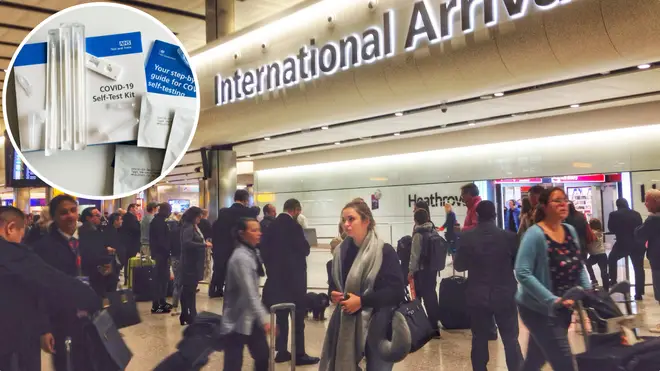
Clare Foges 6pm - 9pm
14 October 2021, 22:30 | Updated: 15 October 2021, 10:21

Fully vaccinated people arriving in England from countries not on the red list can take a cheaper and quicker lateral flow test rather than the PCR version from October 24 - in time for those returning from half-term breaks.
Transport Secretary Grant Shapps said the rule change would make testing "simpler and cheaper" for travellers, and was a "major step forward in normalising" tourism and instilling confidence in international travel.
"Today's rule changes will make testing on arrival simpler and cheaper for people across the country who are looking forward to well-earned breaks for this October half-term," said Mr Shapps.
"Taking away expensive mandatory PCR testing will boost the travel industry and is a major step forward in normalising international travel and encouraging people to book holidays with confidence."
Read more: Eco protesters to suspend blocking roads after drivers fight back
Read more: London's Night Tube will return next month, Sadiq Khan confirms
Eligible travellers will be able to order lateral flow tests from Government-approved private providers, a list of which will go live on the Government website on October 22.
Passengers will be required to upload a photo of their test and booking reference, supplied by the private provider, to verify the results of their test as soon as possible.
Travellers will also be able to book to have a test at centres located in some airports.
Anyone who tests positive will need to self-isolate and take a confirmatory PCR test.

Will you have to film yourself taking the LFT test?
Health Secretary Sajid Javid hailed the success of the vaccine rollout as a major factor in enabling the rule change, and said international travel would be made easier and less expensive for tourists.
"We want to make going abroad easier and cheaper, whether you're travelling for work or visiting friends and family," said Mr Javid.
"This change to testing is only possible thanks to the incredible progress of our vaccination programme, which means we can safely open up travel as we learn to live with the virus."
Read more: Supermarkets accused of 'disguising' poorly-stocked shelves amid supply shortage
Read more: Now 'grinch' Khan blames steward shortage for cancelling London NYE fireworks
The news has been welcomed by travel bosses, with Tim Alderslade, chief executive of Airlines UK, saying it would be a "massive relief" to families hoping to travel over the October break.
"This is great news and we're pleased to get it over the line in time for the crucial half-term period, which will be a massive relief to families desperate to get away this autumn," said Mr Alderslade.
"Vaccinated passengers can be reassured that they do not need to book or take an expensive PCR test when they return to the UK, which will further reduce the cost of travel."
However others have said the changes do not go far enough.
"It's progress but if you're fully jabbed you shouldn't need to take a test at all," said Paul Charles, CEO of travel consultancy The PC Agency.
"Testing measures are not only a faff for many but also amount to a tax on travel and put off people from booking with confidence, due to the higher costs.
"These barriers certainly won't help the travel sector to recover as quickly as it should be by now."
He also pointed out inconsistencies in the rules, saying: "I don't have to be tested if I return from a packed football stadium so why should I have to take a test returning from a business meeting or villa holiday?"

Grant Shapps reacts after red travel list cut
The announcement comes just days after the latest update to the Government's travel lists came into force.
Monday saw the number of countries on the red list slashed from 54 to just seven.
People returning from red list countries will need to quarantine in a Government-approved hotel at a cost of £2,285 for solo travellers.
The countries on the red list are Colombia, Dominican Republic, Ecuador, Haiti, Panama, Peru and Venezuela.